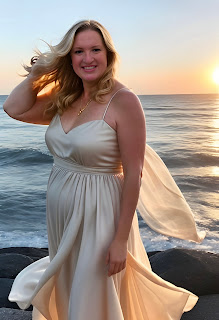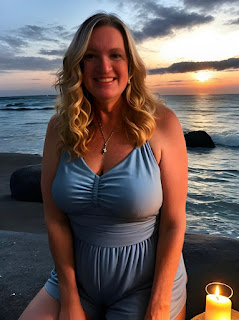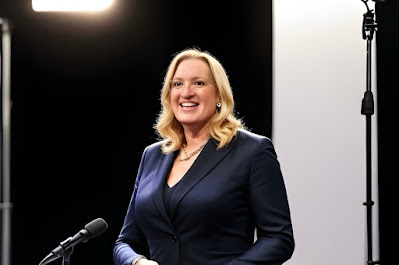Monika: Some people are natural-born leaders, while others grow into leadership through experience and self-discovery. Melissa Reames, an inspiring transgender woman, mentor, public speaker, and General Manager at National Vision Inc., embodies both. Her journey is one of resilience, transformation, and a deep commitment to helping others navigate their own paths. From overcoming shyness to confidently addressing audiences, and from self-doubt to self-acceptance, Melissa has carved out a space where she can uplift and empower. Today, she shares her experiences, insights, and the lessons she has learned along the way. Hello Melissa!
Melissa: Thank you, for having me here.
Monika: Could you say a few words about yourself?
Melissa: I am a 54-year-old transgender woman. I’m married to the most beautiful trans gal, Scarlet! We will be celebrating our year anniversary in April. That is a story in itself. I have a son who just turned 16. His mother, my ex (before transitioning) is a big ally and friend. I’ve been in the optical field all my life. A summer job turned into a career that I love. I began to medically transition four years ago. I’ve been out fully for 3.5 years. Although the world is a little dark politically, I have never been so invigorated or happy since coming out as myself. I love sharing my story and mentoring.
Monika: What inspired you to be a mentor and public speaker?
Melissa: It is interesting because I used to be very introverted and shy. I used to be deftly scared of public speaking. I didn’t want people staring at me or listening to me. You would think, being a trans woman, that those fears would continue because people stare. Yet, it is truly an amazing thing. I transitioned and it was like a rebirth! I am comfortable and happy with myself now. I am not shy. I’m extroverted. I sometimes don’t shut up. Lol. Speaking in front of 40 or 400 people now does not bother me. I truly love public speaking now. I believe it is because I am not afraid to be heard or watched. Plus, I look at speaking differently. I’m now of the mindset that others want to listen, learn, and understand. There is nothing like being on a stage these days to me.
As for being a mentor, when I came out, I had some beautiful voices and people in my life. They did not know me, but they helped me to be comfortable in being myself. I am so happy that I call many of them dear friends today. I, like many others, had some moments and those people at the beginning truly can make a difference in how one’s life unfolds. My mentors definitely helped me. I will always take that to heart and help my trans brothers and sisters.
The first person I mentored, I actually, had no plan. I was at the right place at the right time thanks to my roommate. My roommate saw the signs of a budding trans woman because she had seen those signs in me. This person wasn’t out yet. When I met her, we went out to the patio and we sat there for two hours. I openly answered all questions and discussed my life and what her life could be. Afterwards, my roommate told me how different she saw me at that moment. I was so animated and impassioned to help. My roommate was not wrong. Much like, speaking, helping and mentoring are important to me now.
 |
| "I transitioned and it was like a rebirth!" |
Monika: Melissa, as a mentor and public speaker, what kind of questions do you most commonly get asked, and how do you approach answering them?
Melissa: Oh goodness! There are some good ones. I have been open to any and all questions from day one of my transition. I am also very honest and transparent in my answers. I usually speak in very friendly environments, but that doesn’t mean some are not there with the best intentions. But, I do get a lot of focus on how I knew I was transgender. When did you know you were transgender? It is an interesting story of being four years old. I was being distraught when my mother said no, I wasn’t a girl. I didn’t understand anything, and my parents didn’t either. It was a different time. My self-exploration continued for many years. And, that always leads to, do you regret not transitioning sooner? Of course, not. Many ask about telling people about transitioning and how I did it from work to friends and family. People want to know these things.
I’ve been asked about my own thoughts of suicide. I again, don’t shy away from these questions. And I will show my left wrist. It was a moment of self-doubt and I look back on that moment and say how wrong I was. Life is so much worth living. It might not always be easy, but there is always something to help us keep going. I still will look at my wrist from time to time to remind me of how my own journey had a dark moment. I understand those dark moments too. This is another reason I speak and mentor.
And in those dark moments, I do have those mean-spirited questions proposed to me. I think people ask them as a “gotcha” moment or to try to fluster me. They don’t. I'm asked about trans people in sports. I’m asked about trans minors and their care. I’m asked or told that when I die and archaeologists dig me up in 200 years, those archaeologists will say I was male. As if that will upset me… it is in those moments I do my best to explain gender dysphoria.
I may not have all the answers, but I think being open and honest in my responses is the only way to live and learn.
Monika: Why did you choose Melissa for your name?
Melissa: I actually have contemplated three names in my life. This goes back to seeing myself as female for as long as I can remember. My original name that I would sometimes call myself in private was Darcy. She was my original babysitter and beyond my mother, the only female I knew at that time really.
The next was around fifth or sixth grade when I noticed girls more, but still had no idea why I wasn’t one. At that time, I thought of myself as Jenn. Not Jennifer. Jenn. It was short-lived. And, by seventh grade, I chose Melissa and would never change who I was ever again. Those who know me, my best friend in high school turned out to be Melissa, lol. I told her, because we are still friends to this day, that she was never my namesake. I was Melissa before I ever knew her. Picking my name at that time was almost like picking out your baby’s name. I saw it and I just loved it. I have never given a thought that it was wrong or not me. Melissa is definitely me!
 |
| "Life is so much worth living." |
Melissa: My ex-wife is one. She saw me changing. She saw me being quieter than usual. She like many others, thought something was wrong with me and I wasn’t telling anyone. I got that a lot. People caught my subtle cues that I was changing in my spirit, mind, and body. People thought I was dying, or those that I worked with thought I was quitting. She dragged it out of me. And granted, I was very fearful. This is the Tennessee I live in. If she reacted poorly, I probably would never see my son again. Her reaction when I told her, was maybe one of not complete shock, but shook enough. But, I will say this, and of all my close friends or relatives, she was the only one to go out the next day and get books on being transgender… being a transgender parent for me, and other books. She has always had my back, even if she doesn’t understand certain aspects of what I encounter in daily life sometimes. She was there. We told our son together and his response was pretty relaxed, “So, I have two moms then?” It wasn’t that simple, but he has been very good with my transition too. Thank God.
There are people that I thought would accept me and they didn’t. They never spoke to me again. There are people that I thought would have a horrible reaction, and embraced me so much. I just never knew when I told someone I was transitioning. All I can say, that the reaction I always got the most was, “Are you happy?” And I still to this day always say I am so much happier.
Monika: I finally felt free after my transition. How about you? Is there a specific moment that made you feel like you could truly take a deep breath and say, ‘This is the real me now’?"
Melissa: I think there are many moments along the way as we all grow and learn about ourselves. I think finally making that decision to be happy and be me was the most freeing moment. It only took me about fifty years! Starting HRT was another step to freeing me too. I tend to come back to as I call it, presentation day. The first day I came to work as myself. I was a bundle of nerves. It was more for my crew and not me. I just didn’t want them to get any grief from people because of me. I think some looks got me a little nervous, but I have to say, my crew was the one that really got me through those first days to be the comfortable person I am today. They embraced me. They pushed me out there. They had no issues with me. I had to see that people wouldn’t either. And that has been very true. I never went back to “male” again.
Monika: We all know the journey to being our true selves comes with a heavy price. Like, losing friends, family, jobs, and all that. I must say I am one of them. Did you have to pay a heavy price for being you? What was the toughest part of your coming out?
Melissa: This is tough. I think every trans person has paid some kind of price to be themselves. I was always told that being trans that you are selfish. You only think of yourself to transition. I think this is wrong. It is so very wrong. Although the act of transitioning is for me. I thought about every person in my life this would impact. My ex-fiance was one. We may be incredible friends now, but at the time, she saw me as the “other woman” taking away her “guy.” It was a mind-blowing idea, that I never imagined, but it sadly made sense. I’m happy that we are still friends.
Of course, family is always in this conversation too. My parents were the last to know. And I regret that, but fear is a powerful thing. I can say my parents don’t understand everything about my life. They still and probably will always call me my deadname for the most part. It is a battle not worth fighting. They don’t do it to be purposely mean. They do it because that’s what they have known and raised as their child and as an adult for 50 years. My father did ask if I was happy. (A lot of people asked me this when I told them I was transitioning.) I told him, “Yes, I am so much happier.” He said that is what matters the most. They still love me. They still talk to me. They love my wife. I am blessed in that way. I can’t say this is always the case for other trans people I know.
My brother is another issue. He is someone that beyond holidays and birthdays and the obligatory texts at this time, I haven’t spoken to him since my transition. It is very telling as my wife and I, along with my son, visited my parents. My brother lives fifteen minutes away. Whenever I’ve visited in the past, we always had some family time and a big meal together. No effort was made. It hurts. But, I’ve sadly had to accept it. In my transition, there are people that just aren’t happy or accept it. I also came to realize that I cannot control those people and their feelings. That was a tough thing to accept.
Monika: Do you remember the first time you saw a trans woman on TV or met one in real life that helped you realize, “That’s me!”?
Melissa: Actually, yes! There was an episode of “The Love Boat.” Gopher’s old college roommate is on the cruise. Gopher continues to try and figure out who this woman is, which seems so familiar. She confesses that she used to be Gopher’s male roommate. I thought it was done very appropriately. How Gopher accepts his friend said a lot for the early 80s. Although Gopher’s roommate is played by a female actress, the story was good and I thought accurate looking back on it now.
Monika: Many of us have concerns about “passing” and how society perceives us. Did you face similar worries during your transition, and how did you address them? I know for me, there were moments when I felt like I was in a never-ending game of "Is she or isn’t she?" played by strangers in grocery stores.
Melissa: Blending was a concern. I never called it passing. Passing to me means I’m trying to fool someone. Blending is me showing who I am… living along with everyone else in this crazy world.
One thing I wanted, and it is a dysphoria for me, is my hair. I was not going to ever use a wig. So, even before medically transitioning, I started to let my hair grow out. I look back at my hair when I first came out and I cringe. Beyond trimming the dead ends at times, I have not cut my hair in over four years. I may cut it one day, but it would be traumatizing. I just associated long hair with being me. And that’s my thing… it isn’t everyone’s.
 |
| "I blend. I’m blessed with good skin and now my hair is not a dysphoric thing." |
I blend. I’m blessed with good skin and now my hair is not a dysphoric thing. When I go to the store, I don’t think about it now. It doesn’t bother me, or I just don’t think about it any longer. I just do. That’s not me trying to sound full of myself. This is just my attitude.
I do remember times of having people question my gender. You see it on their faces. Early in my transition, I was out with a friend to lunch. Two different servers and the manager came to check on the two of us. It felt very uncomfortable and unnatural. So much so, that she looked at me and said, WTF. I explained that they were coming by to look and see if I was a gal or a guy. I told her it happens. It was a moment of realization for her, because she never thought people would do that. My friend knew me as both the false male and my female self.
And, she, like many friends, saw me as myself and didn’t think about what used to be.
And, she, like many friends, saw me as myself and didn’t think about what used to be.
I don’t want to think of myself as a curiosity. But, that is how rare transgender people can be, even today. Some don’t know or have ever met a trans person. I visited one town where I may very well have been the first transgender person. It is a scary thought, but it also for me was an undertaking to educate. I wanted those people I met to see, I was not what lawmakers talked about on the news. My life is similar to theirs. We all try to provide for our families. We all try to better ourselves. This continues to go back to why I feel it is so important to be out, to speak, to help people understand.
END OF PART 1
All photos: courtesy of Melissa Reames.
© 2025 - Monika Kowalska


No comments:
Post a Comment